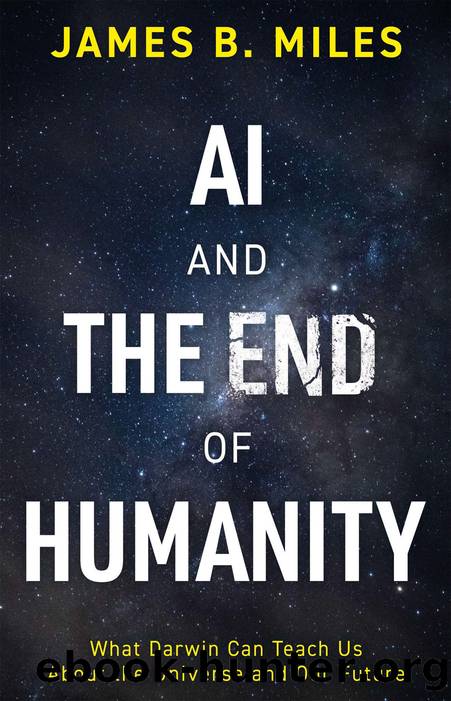AI and the End of Humanity by Unknown

Author:Unknown
Language: eng
Format: epub
ISBN: 0000000000000
Published: 2023-06-29T19:11:59+00:00
HOW RATIONAL IS TYPE II, THEN?
If E.T. cannot be perfectly rational, how far might its rationality have nevertheless taken it? Let us consider the role of reason in the only Type II we have experience of.
âIf the great evolutionists still believe in the myth of free will, why should we trust them on anything?â
â astrophysicist writing to Will Provine, 1 February 2008, after viewing biologistsâ responses to the Cornell Evolution Project
Free will, freedom of choice, freedom for any particular individual to have chosen differently, cannot exist in this or any possible universe. It is formally called the dilemma of determinism, given we inhabit a universe where all current and future events â at least from the point of view of human action â are necessitated by past ones. But it could as easily have been termed the dilemma of indeterminism, where indeterminism recognises events with no cause, as arguably (because this is still much debated) in the quantum world. As the philosopher Paul Russell puts it, âone horn of this dilemma is the argument that if an action was caused or necessitated, then it could not have been done freely, and hence the agent is not responsible for it. The other horn is the argument that if the action was not caused, then it is inexplicable and random, and thus it cannot be attributed to the agent, and hence, again, the agent cannot be responsible for itâ (1995, p.14). As Russell spells out, the dilemma of determinism has stark implications because if our actions are caused, then we cannot be responsible for them, but if they are not caused, we cannot be responsible for them. âWhether we affirm or deny necessity and determinism, it is impossible to make any coherent sense of moral freedom and responsibility.â
We can arguably debate around the concept of responsibility, but we cannot reasonably debate around the concept of moral freedom. The absence of freedom to have chosen differently is woven into the very fabric of the cosmos; it is built into the logic of the universe. And in a world without free will âluck swallows everythingâ, as the Oxford philosopher Galen Strawson puts it (1998), and all of life is reduced to the pure lottery of biological and environmental luck. Before I was mentored in evolutionary paradoxes by George Williams my background was philosophy and metaphysics. Philosophers like my colleagues Bruce Waller (1990, 2006), Derk Pereboom (2001, 2007) and Richard Double (1990, 2002) have written extensively on why, logically, luck swallows everything in human life. The reason that the publishing sensation Yuval Noah Harari can assert as self-evident that âhumans have no free willâ (2018, p.300), and that this is âsuch a radical messageâ with âsinister implicationsâ (p.251), is largely because of Bruceâs, Derkâs and Richardâs earlier, and courageously contrarian, analyses. And the above leads to some fascinating insights. For 3,000 years the most sought-after principle in ethics has been the possibility of an objective base to knowledge. The absence of free choice â and
Download
This site does not store any files on its server. We only index and link to content provided by other sites. Please contact the content providers to delete copyright contents if any and email us, we'll remove relevant links or contents immediately.
Sita - Warrior of Mithila (Book 2 of the Ram Chandra Series) by Amish(54844)
The Crystal Crypt by Dick Philip K(36850)
Cat's cradle by Kurt Vonnegut(15324)
Always and Forever, Lara Jean by Jenny Han(14881)
Ready Player One by Cline Ernest(14631)
The Last by Hanna Jameson(10244)
Year One by Nora Roberts(9777)
Persepolis Rising by James S. A. Corey(9343)
The remains of the day by Kazuo Ishiguro(8965)
Never let me go by Kazuo Ishiguro(8867)
Red Rising by Pierce Brown(8747)
Dark Space: The Second Trilogy (Books 4-6) (Dark Space Trilogies Book 2) by Jasper T. Scott(8164)
The handmaid's tale by Margaret Atwood(7750)
The Circle by Dave Eggers(7099)
Frank Herbert's Dune Saga Collection: Books 1 - 6 by Frank Herbert(7049)
The Testaments by Margaret Atwood(6877)
Legacy by Ellery Kane(6645)
Pandemic (The Extinction Files Book 1) by A.G. Riddle(6521)
Six Wakes by Mur Lafferty(6231)
